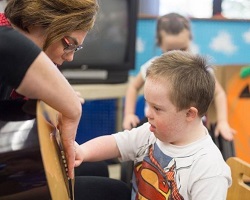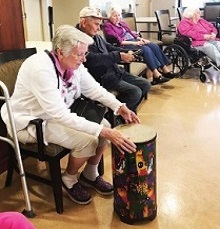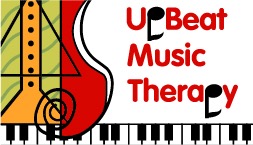Programs For All Ages
Upbeat music therapists create music therapy experiences to address non-musical goals. Beyond group and individual experiences, special groups such as ukulele club, singing circle, bell choir and percussion-based groups can be designed to meet your students’ or community’s needs.


Schools
Upbeat music therapy provides both group and individual services to children in the public or private school setting.
Private Sessions
Our therapists are available for tailored 1:1 sessions in the client’s home to meet their individualized goals.
Older Adults
Music therapists are available for group and individual sessions in independent, assisted living long-term care facilities.
School Programs
Upbeat Music Therapy provides both group and individual services in the public or private school setting. The music therapist will meet with teachers and school administrators to determine the model that best fits the needs of the school. Therapists can design a program specific to the school in order to support your students’ individualized educational goals, as well as overall program goals.
Specialized adapted experiences that address specific goals are available.
Examples include:
- Drum ensemble
- Bell choir
- Singing paired with ASL
- Therapeutic performance


Individual Sessions
Upbeat music therapists complete an initial assessment for each client to determine goals and a treatment plan. The assessment includes input from the family or caregiver, as well as a series of music-based experiences that help the therapist determine the strengths and needs of the client. When appropriate, the therapist will also consult with the client’s other therapists, such as OT’s, SLP’s, teachers, or the care team.
The therapist will provide the client, family or caregiver with regular feedback related to progress towards goal achievement.
Goal areas commonly addressed during individual sessions are:
- Improving communication skills
- Improving cognitive function
- Improving motor skills
- Increasing attention span
- Improving behavior
- Developing social skills
- Developing coping skills
- Learning stress management skills
- Decreasing anxiety


Assisted Living, Long Term & Dementia Care
Assisted Living & Long Term Care:
Music therapy interventions in both assisted living and long-term care facilities improve the quality of life for residents and help them maintain their highest level of functioning.
Services are provided both individually and in groups. Research indicates that these experiences:
- Decrease depression and improve mood
- Aid in adjustment to change
- Increase connection to the community
- Provide opportunity for self-expression
- Decrease anxiety
- Decrease feelings of isolation
Dementia Care:
Research indicates that music therapy is effective in reducing behaviors and psychological symptoms of dementia. The music therapist will design both group and individual sessions that engage clients in a variety of experiences to improve their quality of life. Family sessions are also available to help facilitate family members connecting with their loved ones. Examples include drumming, singing, playing instruments, and moving.
Research indicates that these experiences:
- Decrease depression and improve mood
- Decrease anxiety and agitation
- Decrease the need for medication
- Increase alertness and orientation
- Enhance cognition and memory recall


